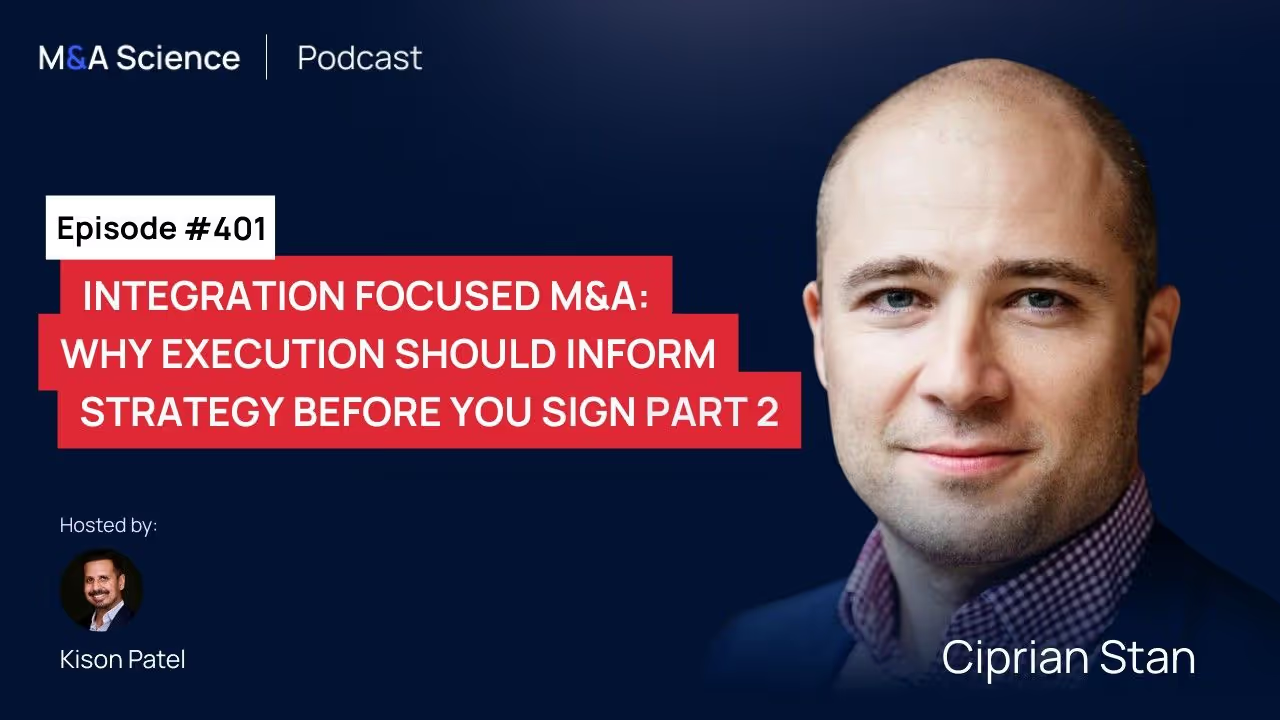
Jeremie Bacon
Jeremie is an entrepreneur and CEO in the B2B SaaS and outdoor recreation industries with a 20-year track record of success in organization building, sales & marketing execution, operations, and financial management. He is the cofounder of The Forge Adventure Parks / The Forge Charitable Adventures and former CEO of Imagine technology Group and Synap Software labs
Episode Transcript
Intro
In this episode, Jeremie Bacon and I discuss pre diligence and quick integration. Jeremy has 13 years of experience building SaaS companies and is currently the co-founder and CEO of Synap Software Labs. With experience on both sides of M&A as an acquirer and ‘’acquiree”, Jeremy brings a unique perspective to this podcast. He highlights the importance of pre-diligence, how to mitigate uncertainty and why it's advantageous to create value for the other side.
Here's more on Jeremy's background
I'm the co-founder and CEO of a software company called Synap Software Labs. We build post-sales relationship management software. I've been building SaaS companies for 13 years, and Synap is one of many that I've started and run. Before that I was in investment banking, doing equities, and equity sales.
Let’s get a little bit into your M&A experience specifically. Can you run me through a little timeline about that?
I've had the opportunity to be on both sides of the M&A world as an acquirer and as an acquiree for over 10 years now and through a couple of dozen different transactions in total. A lot of those transactions have not actually closed and we've never consummated those deals and gone through with them, and a bunch of them we have.
These different experiences helped me get a deeper understanding of what it means to actually run a process, sell a business, buy a business, and then make a successful integration and transition.
How has your perspective changed from early beginnings to your perspective today?
The reason that I believe most M&A fails in the first place is that because too many companies focus far too much on what they're going to get out of a deal versus what they're going to give to it. It sounds really simple, but it's true.
Those deals where we have been focused on what our organization could give as the buyer or the seller have always worked out far better and had better outcomes for the deals we've closed. From a diligence standpoint, what's helped a lot of those transactions to be even more effective was when the other side had the same approach.
It seems like you can take that perspective into integration
Absolutely. Oftentimes when you're entering a new market through acquisition, it's easiest to see that the acquirer and the acquiree have gone into business together for the wrong reasons. A good example was when Google bought Motorola and they ended up selling the entity that they bought for two 12.5 billion, for just under three.
You see this again and again across M&A in general. Many overpay for assets, and what happens in the end, you lose all that value and it destroys it. You lose a bit of your reputation along the way, as well as a business and as a group of operators and everything else.
Let's talk a little bit about specifically your approach to diligence and what you learned
When you do due diligence, it's about a lot more than just the DDQ and the data that you get in a deal room or the qualitative assets. There needs to be constant research on your space, your sector, on the players that are tangential to you, on the players that are directly competitive to you, and the players that are in spaces you'd like to be but don't have a product roadmap to get there.
You have to do a lot of diligence, understand what's going on in your market, and then tactfully get to know those companies before the possibility of an M&A conversation is even broached.
I think that great due diligence starts early, and includes a lot of people because the reality is that the executive viewpoint on a business is always different from the operational ground-level employee and teammates’ perspective. If you've done your diligence and you know that business, their people, and the customers, the conversation at the CEO to CEO level can be a lot more credible
It sounds like you do a lot of this pre diligence activity yourself. Are you bringing other people in at that time?
Absolutely. I think that the more people you can have, involved in your diligence process the better, many of them participating indirectly.
For example, once we had identified the company we wanted to buy, we started watching them grow and watching their development, their products, and marketing and realized they were complementary to ours. Even from 18 months before we started the process, I had as many of my people as I could get to know their people, while I'm doing the same thing.
This is pre diligence, or this is the early stage before talking about terms for doing a deal?
Yes. You want to know what it is you're going to be able to give that company when you approach them as the buyer. If I can show up to you and say something along the lines of: “Hey, I've been watching your company. I like what you're doing and here is my understanding of how we can grow together’’ it's incredibly empowering for both parties to have a relationship that starts like that.
If during the actual diligence you come to realize that there is something there that doesn't align with your strategy and goals, you can walk away and remain on good terms with the other side.
What are some other things that you do in terms of getting into the deal terms and approaching diligence?
When it comes to doing the deal there's not a lot of people that are needed, and where they are, they're not all needed for every part of the deal. Where you end up needing and wanting more people in the room is when you're talking about how you're going to use your labor pool and trying to understand where you are going to have redundancies and how you'll deal with that.
During those processes, you need more people involved in that managerial chain to help you make the right decisions about what you should do. Integration has to be quick, otherwise you run the risk of destroying a lot of value that you could otherwise create.
I've heard different views in terms of approaching integration, so I am curious why do you think it should be done fast?
If you walk into a deal, knowing exactly how you want to use the assets, the rest of the diligence process is just you figuring out whether or not your assumptions and hypothesis are correct. And if they're correct, executing that plan should be relatively straightforward.
You certainly do need to be thoughtful, cautious, and aware of what you're doing. I think that it's not the change that people fear, but uncertainty, when they don't know what's going to happen to them, their team, or their job.
This is why you want to be able to go in day one and say” This is what we're doing. This is how it's going to work. This is who it's affecting. This is why it's affecting you or your teams or your products. Here is who is no longer going to be part of the new business going forward, but here is what we're doing to help you and your team transition into something else.’’
In my experiences, it's always been less painful to be very open, very transparent, very abrupt, and just get it done because prolonged uncertainty is just unbearable.
Did you have any hard lessons during an integration?
It comes back to the ‘’give versus get’’ approach. Transactions that could have benefited, not just the owners of the business and the employees, but the customers and the industries that they're serving have fallen apart for ridiculous reasons like people's pride, people's desire for absolute control, ego, and selfishness.
Do you have any interesting examples?
There was one deal that I was involved in where we were going to be bought. The acquirer had done all the diligence, and everything was ready.
As we got closer and closer to the end of the deal, it started to become more and more clear that some of the stakeholders on their side were far more interested in what they personally were going to get out of the deal, than what they were going to be able to contribute.
In the last several weeks things got increasingly complex and heated, not because any sort of invalid thesis had surfaced that meant the deal didn't make any sense, but because of egos who started fighting with themselves internally about who was going to get to do what.
In the end, there was so much ugliness there that the CEO on the other side decided not to do the deal. That was sad because it would've been a wonderful deal for everybody and a great thing for customers and the broader industry.
What could have been done to avoid that?
When someone's coming to buy your business, you are subject to their process and their process, unfortunately, didn't allow for us to get in deeply with those teams until it turned out too late in the process.
I'm curious, what's your take in terms of working with different advisors on transactions and what you've learned?
I think it's important to have other people at the table that have seen and done more deals than you have. Every time I've been the buyer we've always had counsel, but it's tended to be more focused on the legal, accounting, finance, and audit side than it has been on the strategy and diligence side. As the buyer, I've never engaged a banker to help me run a process.
On the flip side, as the seller, I think you do yourself a huge disservice to try to self-represent. That's not necessarily because the banker can extract more value from the deal, but more to help you deal with finding the market, getting to the right people, getting meetings set up, and helping you with your diligence deck.
I think having that sort of auction process and being able to present your opportunity to a mix of strategic financial buyers and just getting as broad a view as possible can be tough to manage
It's really hard. Sometimes your banker will get you a better price, but I think the price is the wrong thing to focus on as a buyer or a seller. Instead, you got to focus on value, identifying those value drivers that are going to make a difference to your business and then identifying those points within a business that may or may not have value to you.
The business might have 10 points of value that someone could try to sell you on, but they may make sense for your business. You simply may not have the strength expertise, balance sheet, network, or infrastructure to support those other business lines or assets. Value is always driven by what you're going to get out of a transaction by giving your own resources back to it.
So focus on value, not the dollar in the pit
You focus on the number to a certain extent. Every banker is going to come in and their goal is to sell you their service and they're going to tell you what they think you want to hear along with what they think you should hear. They usually present me with a pitch book that promises insane raise in sales or something similar. That happens, but it doesn't happen very often and it's generally bad for the business. When people overpay for assets usually happens when they thinking about what they're going to get, versus what they're going to give.
How would you go about picking a banker? What is your real deciding factor in picking a banker to work with?
It varies. I think the most important thing is the relationships that those banks have with the acquiring companies. So, if I know that Microsoft is a good acquire for my business, I want to work with a banker who has done a lot of transactions with Microsoft, particularly a lot of deals with Microsoft in the SaaS XYZ space. And I want that person to know my business because the last thing you want to do is spend your entire diligence process teaching your banker about your business and your industry. Picking someone who's got a very deep bench and a specialized practice area focused on what you do is hugely important. They should also know the person running the business that should acquire my business.
So just as a service provider to investment banks, a perspective I would throw in is a ‘’one size fit’’. I'm curious if you've ever come across that
For sure. It's hugely important to understand where you fit in terms of not just as a business, a product, market, and customers, but whether or not you're going to be important to that company. One of the earliest breakup stories that I ever had where we got dumped was when we, a $20 million business, was looked at by a billion-dollar revenue business.
We knew what they could give us, and that was distribution resources, channels, partners, and the opportunity to grow our business dramatically. But what we had failed to do on our side was ask, okay, what are we giving back?
Our market, our niche, our vertical was just too small and it was never going to be able to move the needle enough. They needed to buy a business with a couple of hundred million dollars in revenue, not one with $20 million in revenue, and we failed to see it.
We wasted a lot of time on that deal in one week when we shouldn't have, because it should have been obvious that after the first meeting that this is going to work for us, but not for them.
Something that matters, and not just when picking a banker is culture and that's something that can be a big barrier. I'm curious if there's a way or perspective that you can look at that and see it as a consideration
It’s always a consideration. You can't wait to dive into a deal without thinking about whether there is a cultural fit and, and are the two like-minded as organizations and as operators. Finding that out is something you have to do before you even start going down the path of discussions about M&A as part of your pre-diligence.
I remember talking to a CEO a while back, who said that just a walk through the office would give him enough of that instinct about if this was something that was going to fit and work. I'm curious, what would be certain factors in terms of getting that culture or fit feel for you?
I agree with that, and I think it's even more important if you're the one being bought to walk through the offices of the one who's going to buy you. If I want to meet your people and see your space, and I get denied, that is a pretty clear sign that there's not going to be a cultural fit.
What you can immediately find out as you're walking through someone else's office is whether people look and feel like the people at your office or your company? Are they doing things and behaving similarly? Can you envision their people and your people becoming friends? Are we like-minded? Are there shared common points of interest that are blatant as you're looking around the office?
Was there a situation where you almost instantly got a feeling of whether or not things are going to work out?
There were a couple of different things. One was when we went onsite to meet with the management team, and this was before we'd even told them that we were interested in buying the company. The way that their executive staff treated and behaved around some of the support staff was just unacceptable.
Those are the scenarios when you can just tell that the way that people treat other people is just not in line with the way we want to treat our people and be treated.
When working on these transactions, how would you view setting up a process to be able to manage all of these activities and things that go on during diligence and through the immigration phase?
For every deal you do, it's good to sit down and build out a framework for how you're going to proceed with the deal. How are you going to proceed with the diligence? Who you're going to get involved in what parts of the diligence and why? Where do you think it makes sense? You have to have to do that level of preparation. You also have to communicate very early in the process to the people who are going to want to be involved in due diligence to help set and align expectations for what they're going to do and what they're not going to do.
Deciding whether or not each department in the business is ready and could be made ready to work together and where those synergies are is not the job of the CEO. It's the job of the people who run that department on both sides of the house.
Connecting these parties, running these common divisions during diligence - is there a challenge to that? What if you're going through some sort of stealth acquisition where not a lot of people know about it?
It depends. There might be situations where everything is so stealth that very few people know about the deal. Most of those situations tend to be done with the intent to continue to run them separately, so there's interaction, but it's mostly at the top. Those types of deals that you can do more easily with fewer people involved.
But when you're buying a business that has overlapping assets and overlapping functions and overlapping products, and particularly if it's a competitive deal, you run a bigger risk of having a hard time ripping off the band-aid and integrating the business successfully if you don't have the right people involved in the process early.
It can be tough, because when acquiring you can have duplicate roles, and one of those two people is going to have a role change. That’s why you have to have a team that's solid and a team that's mature enough to be able to handle that situation.
It seems like all of these problems and issues come back to communication. How do you facilitate that to ensure things get communicated clearly, and people are aligned to make a project successful?
The more face-to-face interaction the deal team can have throughout the process the better it goes. It takes a lot of time to make sure that every single day or every couple of days, you get everybody in the same room and you talk about what's going on, who's doing what, how it's coming together, what the weaknesses and the questions are and the concerns are.
So just pushing a lot more face to face meetings. How about the technological side? What tools do you use for complex projects?
You ultimately want simplicity. We use Trello for deals all the time. You can use any project management tool to build a project, keep your notes and your cases on it, and have people comment and do stuff. That is important because you want to hear everyone's voice.
Keeping everyone on the same page is a combination of email or chat apps combined with digital tools to keep track of who's responsible for what, all the questions and concerns. It is the place to go when you want to access all of the diligence materials that have been provided for you by the buyer or the seller.
Every deal is different. You might have a great template that works 80% or 90% of the time, but you're always going to be creating new stuff to think about and have new angles from which you need to approach a deal and look at diligence.
What about the prioritization of things during the transaction?
It's important that when you're looking at the overarching project plan you allow yourself to be flexible and shift priorities because inevitably they will get shifted as you will always have new information coming your way. You need to be flexible with regards to timing, but you also need to be rigid in the overall process, meaning you should never just skip over something or deem it least important.
It is always the stuff that you didn't look at close enough, or at all, that comes back to bite you. Prioritization is important, but you need to make sure that you do everything you need to do.
What are some of the things that you would have done differently on some of your deals?
For me, it comes down to this notion of giving versus getting. In my earliest M&A interactions, I was too focused on what value was going to be extracted from the deal versus created by the deal. You want to help the person in front of you and get more out of the transaction.
I have learned the lesson and started thinking about those transactions, the same way that I would about selling something to a customer, and became focused on the value they're going to get versus the value I'm going to get.
Another thing is, the first couple of times that I was doing deals as a buyer or a seller I was under-resourced. I’ve learned how important it is to allocate the right number of resources, the right amount of time, the right number of people, the right amount of money to a process to get it right.
Ending credits
Thank you for taking the time to explore the world of M&A with our podcast. Please subscribe for more content and conversations with industry leaders. If you like our podcast please support us by leaving a five-star review and sharing it. M&A Science is sponsored by Deal Room, a project management solution for mergers and acquisitions. See you next time!
M&A Software for optimizing the M&A lifecycle- pipeline to diligence to integration
Explore dealroom

Want to wear your M&A expertise?
Check out the M&A Science store.

.avif)



